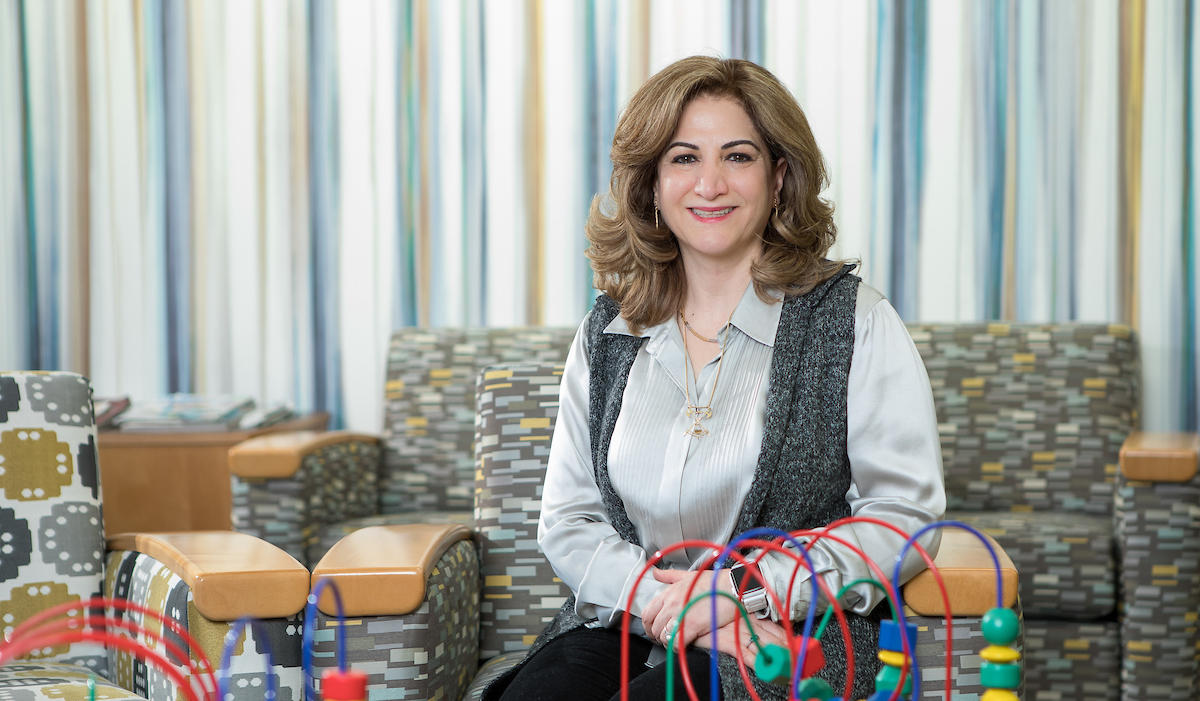 Mojdeh Bayat, a professor in the College of Education, is an expert on early childhood education and education of children with developmental disorders. She has advocated for children with learning disabilities in West Africa and Mexico. (DePaul University/Jeff Carrion)
Mojdeh Bayat, a professor in the College of Education, is an expert on early childhood education and education of children with developmental disorders. She has advocated for children with learning disabilities in West Africa and Mexico. (DePaul University/Jeff Carrion)
In today's world, there are many misconceptions about mental health, especially with children. Mojdeh Bayat, a professor in the College of Education, explains when one knows how to teach and interact with all children, there is great hope for success. Specifically, children who have mental health issues and developmental disorders need proper, adequate support, she believes. Read on to learn how Bayat advocates for the human rights of children with disabilities.
What interested you in a career focused on children's mental health?
I began studying children with special needs because my son has severe autism. I later gravitated toward studying children who have problems with social-emotional development. At the same time, I started teaching doctoral courses, which led me into the area of mental health and early trauma.
In the last five years, I have become interested in mental health issues and how those issues can start in infancy and can carry over into the next generation. I broadened the scope of my work to study how events and early interactions can dictate mental health issues in both early childhood and throughout their life. Just because something goes wrong in the early life of a child does not mean that there isn't hope. I am intrigued to see how we can work with children who have experienced trauma to enhance their psychological resilience.
Tell me about the work you did with children in West Africa and Mexico.
In developing countries, kids with special needs often do not have an environment to thrive. In West Africa, these children are often not looked at as human beings. In Mexico, there is a struggle to understand how these children can be in an educational environment alongside peers who are more able-bodied.
While in Africa and Mexico, I worked on public awareness of children with developmental disorders and mental health issues to make sure that there is good, positive information out there about these children. There is tremendous potential and ways for these children to learn if we know how to teach and work with them.
How has your work developed over the years?
Over the last three years, I have solidified an approach that works with children and parents using both science and a theory called, Resilience-based Interaction Model. This approach draws on the science of resilience - research in positive psychology, along with psychoanalytic and behavioral approaches informed by genetics and neuroscience. The model is a combination of how the brain responds to stress and trauma, how emotions are formed and how teachers and parents can interact with children in order to be emotionally responsive to their needs. This approach showcases how to use language, responses and how we work with children in order to guide, support and help them. This way they can problem-solve, understand their own emotions and interact with peers and adults in adaptive ways.
Do you teach this approach to DePaul students?
I teach students the basics of the model, which is then used in their field experience. My students reported that there was a tremendous change in the children they worked with, and teachers almost always wanted the model taught to them. This feedback convinced me that my model is effective. Since then, it has evolved immensely.
A good number of my doctoral students have become very interested in the social-emotional part of children's development. A few of my students have become particularly interested in the model, so they help me carry out this project. They have become very fundamental in shooting ideas back and forth with me, helping me think through my ideas in a large way. I am not only grateful for their assistance, but also for their collaboration and thoughtful contribution.
What is your hope in working with these children?
Over the years, studies show children have become less resilient: less able to positively adapt to hardships and grow stronger despite adversities. Much of it is due to the inappropriate ways some adults have come to believe children must be treated, raised and educated. In order to teach children to master skills, be persistent, overcome frustration and meet challenges, adults must know how to support their social-emotional development.
My goal is to establish that social-emotional, mental and behavioral development of children should be at the forefront of early childhood care and education. Academic success grows out of a healthy mindset which is very much dependent on social-emotional development.
Whether they have special needs or not, children are seldom considered to have equal human rights. All children are at the mercy of adults, especially those who are at-risk and with special needs. Despite growing up, some of these children will not able to defend themselves or their human rights, due to their developmental limitations. My work is about helping others see that all children have dignity and should be respected for their personhood, cared for and supported.